UPDATED: 8:00 a.m. ET, Mar 7, 2024
It’s a tragic story told time and time again: Black people convicted of crimes they never actually committed.
After spending 34 years behind bars, 61-year-old Ronald Johnson was released from prison after a Philadelphia Common Pleas Court judge vacated his conviction.
According to the Philadelphia Inquirer, Johnson was released Monday night after Judge Scott DiClaudio after the District Attorney’s Office moved to dismiss all charges.
Johnson’s lawyers at the nonprofit public interest law firm Phillips Black insisted that prosecutors withheld evidence discrediting the only two witnesses in the case, therefore his case was tainted.
“For over three decades, Mr. Johnson and three generations of his family have fought tirelessly to prove his innocence,” the firm said on their website.
There were no fingerprints, ballistics, DNA or any forensic evidence pointing to Mr. Johnson. According to the law firm’s website, Johnson was convicted solely on the false testimony of two witnesses.
During the investigation, the witnesses told police that Mr. Johnson was not present at the crime and identified a different perpetrator. At trial, however, police suppressed this critical evidence, and then lied about it on the stand.
“Watching Mr. Johnson and his family weep as the Judge banged his gavel and ordered his release, was a beautiful and profound moment,” said Stephen Lazar, a member of Mr. Johnson’s legal team.
After spending nearly 40 years behind bars for a crime he didn’t commit, Harold Staten, 71, was released was prison Monday after a judge overturned his wrongful conviction.
According to ABC News, Staten was found guilty of murder after a fire he allegedly set led to the death of Charles Harris, Harris and three others jumped from the home’s second floor once the home burst into flames, but he would later die from severe burns three days later.
After Charles Harris’ arrest, he was convicted and charged with arson, second-degree murder and other related charges and was serving a life sentence without parole.
The Pennsylvania Innocence Project filed a Post Conviction Relief Act petition and fought to help exonerate Charles Harris for over ten years.
“We have been working on Harold Staten’s case in various ways for over a decade and are elated that he is now home with his family to start the next chapter of his life after nearly 4 decades of wrongful incarceration,” the Pennsylvania Innocence Project, told ABC News.
In 2022, The DA’s Conviction Integrity Unit reviewed the Innocence Project’s petition on behalf of Harris, which revealed that due to lack of evidence, the cause of the fire should have been undetermined, rather than arson.
“Fire investigation experts for both the defense and the Commonwealth independently concluded that the tragic fire that led to Mr. Staten’s conviction should never have been classified as an arson,” The Pennsylvania Innocence Project said in a statement.
“Ultimately it was Mr. Staten’s own relentless efforts to prove his innocence that led to this result,” the Pennsylvania Innocence Project told ABC News.
A bombshell study in 2017 confirmed what Black people had long known to be true: that Black people are more likely to be wrongly convicted of murder than people from any other group. To add insult to the injury of wrongful convictions, innocent Black people waited years longer than the average time it took a white prisoner accused of the same crime to be exonerated.
“It’s no surprise that in this area, as in almost any other that has to do with criminal justice in the United States, race is the big factor,” Samuel R. Gross, a University of Michigan law professor, told the New York Times.
Of course, the so-called Central Park 5-turned Exonerated 5 are perhaps the most widely recognized instances of Black people being cleared following wrongful convictions. They were the group of Black and brown teens who were falsely accused and imprisoned between five and 12 years stemming from false allegations of raping a white woman in the 1980s.
The list of Black men, women, and teens who have faced wrongful convictions from prosecutors after being unjustly arrested and accused by corrupt police officers is far too long.
Keep reading to find a growing list of additional examples.
1. Steven Ruffin
In January, Steven Ruffin was finally exonerated after spending 14 years in prison for a murder he did not commit. Ruffin was cleared of a deadly 1990s shooting after prosecutors believed the killer was an acquaintance of the victim.
According to AP, Steven Ruffin was paroled in 2010, but says getting his conviction dismissed and his name cleared “will help me move on.”
In February 1996, 16-year-old James Deligny was shot and killed after a confrontation over jewelry.
According to reports, Ruffin and others were looking for a robber who had stolen earrings from Ruffin’s sister, but Deligny wasn’t the robber.
Police say they were tipped off to Ruffin, who was then a 17-year-old high school student. The victim’s sister then identified Ruffin in a lineup, that a court would later deem flawed. Ruffin also told police he witnessed the shooting but wasn’t involved.
He told prosecutors during their recent reinvestigation that he had nothing to do with the shooting and didn’t give detectives the gun. He also said he never confessed to anyone, though prosecutors say Ruffin’s stepfather, sister and late mother all have said he made admissions to them
“I lost 14 years of my life for a crime that I didn’t commit,” Ruffin said.
“If you know you’re innocent, don’t give up on your case — keep on fighting, because justice will prevail. That’s all I’ve wanted for 30 years: somebody to listen and really hear what I’m saying and look into the things I was telling them.”
Now Ruffin says he focused on his career and showing the world that his conviction never defined who he truly was as a person.
“This never really spoke of the person I was or the man I was going to become,” said Ruffin. “So this, to me, is a great closure of a chapter in my life, but my life is still going up.”s court gave Long a new hearing and his conviction was soon vacated. Long was then released from prison and granted a full pardon of Innocence by Gov. Roy Cooper later that year.
2. Ronnie Wallace Long
Ronnie Wallace Long reached a $25 million combined settlement from the city of Concord and the state of North Carolina for being wrongfully convicted and imprisoned for 44 years.
According to AP, the settlement will end a wrongful incarceration lawsuit filed by Long’s attorneys in 2021.
In the settlement was a public written apology from the city of Concord, which has agreed to pay $22 million of the settlement.
“We are deeply remorseful for the past wrongs that caused tremendous harm to Mr. Long, his family, friends, and our community,” the city’s statement read. “While there are no measures to fully restore to Mr. Long and his family all that was taken from them, through this agreement we are doing everything in our power to right the past wrongs and take responsibility.”
Long also received $3 million from the State Bureau of Investigation “as a result of the SBI’s role in hiding evidence from Mr. Long and his legal team that proved his innocence,” according to his attorneys.
In 1976, Ronnie Long, now 68, was accused of raping a white woman, then convicted by an all-white jury. Long was only 21 years old when he received two life sentences for a crime he didn’t commit.
Long then turned to the wrongful convictions clinic at Duke University’s law school, where he would receive help appealing his criminal case. Long’s attorneys also said that of the 40 fingerprints collected from the scene, none matched Ronnie Long’s.
In August 2020, a federal appeals court gave Long a new hearing and his conviction was soon vacated. Long was then released from prison and granted a full pardon of Innocence by Gov. Roy Cooper later that year.
3. Marvin Haynes
On December 11, Marvin Haynes was released from prison after serving 19 years for a crime he had nothing to do with.
Haynes was able to return home before Christmas with a positive outlook on his future. Since his release, Haynes has already started to rebuild his life. According to Fox 9, Marvin Haynes has already been on job interviews, has opened a bank account and gotten his driver’s license.
“Man, I am feeling good to be out here really free,” Haynes told FOX 9. “That is amazing, man. I was just in a cell, literally on lockdown for the whole weekend. You feel me? So, this is beautiful, this is amazing.”
In 2004, when Marvin Haynes was only 16 years old, he was wrongfully convicted of first-degree murder in the deadly shooting of Randy Sherer during an alleged armed robbery attempt.
Minneapolis police immediately pointed to Haynes as their primary suspect with no fingerprints, no DNA, no surveillance video, and no murder weapon tying Haynes to the murder. Despite the lack of evidence, Haynes was found guilty and sentenced to life in prison.
Thanks to the Great North Innocence Project, Hayne was able to get his conviction tossed due to unconstitutional investigative tactics, according to Fox 9.
“Conditions were never good in prison,” Haynes recalled. You know, I mean, I will never say that it was even bearable. I hated it, every second, every moment in there. “So, this is big, this is major right here to come out here,” he said.
He continued, “It is a lot of people in there that is wrongly convicted that will never see this because the justice system just won’t give them justice. So, for me to overcome that and be here and seeing this man, I feel good.”
4. Darien Harris

Source:Twitter
In 2014, Darien Harris was convicted of a fatal shooting at a gas station on Chicago’s South Side. Harris would spend the next 12 years in an Illinois prison for a crime he did not commit. He was finally released from prison on Tuesday.
His case, as well as dozens of others, were picked up by attorneys with The Exoneration Project to seek justice for the wrongly- convicted in Chicago’s Cook County.
According to AP, since 2009 more than 200 people have been exonerated through the group’s work, according to data from the organization.
“It does seem in the past few months there have been a larger number than usual,” said Lauren Myerscough-Mueller, a lecturer in law and staff attorney for The Exoneration Project at the University of Chicago Law School.
Darien Harris, who was sentenced to 76 years in prison, says he’s a fighter and was never gonna give up on his freedom.
“But I fought, and now I’m here,” Harris, now 30, said after his release. “I fought. Keep on fighting, everybody. Just keep on fighting. Never give up.”
According to Harris’ attorney, evidence showed that the eyewitness had advanced glaucoma, was legally blind, and lied to the court about their eyesight problems during trial. Lawyers also found testimony from a gas station attendant who said Harris wasn’t the shooter.
“It always was a very thin case. Darien never should have been convicted in the first place,” said Myerscough-Mueller.
Harris was one of four Chicago men to be exonerated over the past few weeks.
James Soto and David Ayala were both exonerated after spending more than 40 years in prison.
5. Wayne Gardine and Jabar Walker
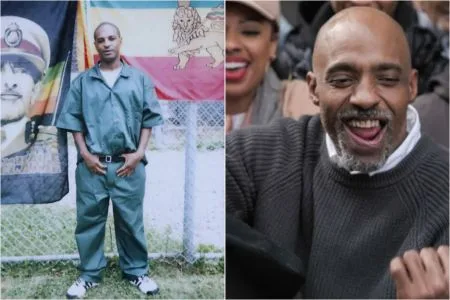
Source:Screenshot and The Innocence Project
That truth was also revealed in November with the exonerations of two Black men who were imprisoned for a combined more than a half-century for murder convictions in New York City that newly discovered evidence showed they had nothing to do with.
Thanks to the Manhattan District Attorney’s Office, which on last month announced the exonerations Wayne Gardine and Jabar Walker are now officially free.
Manhattan District Attorney Alvin L. Bragg, Jr., today announced his Office moved to vacate the conviction of Wayne Gardine, 49, for a 1996 murder conviction in the shooting of 22-year-old Robert Mickens; and Jabar Walker, 49, for a 1998 double-murder conviction in the shooting of 32-year-old William Santana and 30-year-old Ismael De La Cruz. Walker, who was 23 at the time of his conviction, was released from prison today after serving 25 years of two consecutive terms of 25 years-to-life in prison.
In Gardine’s case, “a joint investigation between the Office’s Post-Conviction Justice Unit and the Legal Aid Society uncovered new evidence from a second witness that undermined the testimony from the sole witness used at trial,” the DA’s office said.
In Walker’s case, a key witness “recanted his testimony under oath in 1999 and 2021, saying he was pressured to implicate Mr. Walker,” which the DA said shows he “received ineffective assistance of counsel, as his defense attorney failed conduct a meaningful investigation or adequately probe the weaknesses in the testimony of these witnesses.”
6. David Sparks
In 2006, David Sparks was convicted of a murder he did not commit. Now 17 years later, Sparks is finally a free man.
According to The Philadelphia Inquirer, David Sparks was exonerated on Nov. 6 after serving 15 years in prison for the murder of teenager Gary Hall. Sparks, who was only 16 years old when Hall was killed, was arrested even though witnesses claimed they knew who committed the murder.
Witnesses pointed the finger at a man named Ivan Simmons, whose brother had been seen arguing with Hall the day he was killed. Simmons would later be fatally shot in what Hall’s friends believe was retaliation for Hall’s killing.
But, police ignored those situations and circumstances and arrested David Sparks, who’d been picked up by police for violating curfew the night Hall was killed.
Sparks would spend the next 15 years behind bars until he was finally exonerated after the Pennsylvania Innocence Project found new evidence that proved Sparks was not the shooter.
“Based on that evidence, the court is convinced that the verdict should be overturned,” Common Pleas Court Judge Scott DiClaudio said during court proceedings Monday. DiClaudio also said that this was the sixth murder conviction he had tossed out in three days, “That’s gotta be a world record,” said DiClaudio.
“This is past due. We’re burnt out,” Dominic White, David’s younger brother, told The Philadelphia Inquirer. “We feel like he never should have been there. So at this point we just want to get away. There’s nothing to celebrate.”
7. Patrick Taylor
In 2007, 54-year-old Patrick Taylor was convicted of murder and served 16 years in prison for a crime he didn’t commit.
According to ABC 7 Chicago, on Wednesday, a judge dropped charges and the conviction of Patrick Taylor, who was sent to prison for Rolling Meadows murder when he was 38 years old for a crime his lawyer says he had nothing to do with. The now 54-year-old Taylor will soon be a free man.
“Patrick was misidentified by a number of witnesses and lost the next 16 years of his life,” said Elliot Slosar with the Exoneration Project.
Patrick Taylor was arrested on charges stemming from a brutal 2006 murder of 30-year-old Marquis Lovings and was convicted in 2011.
During the trial, Taylor’s attorneys claimed that his conviction was based on mistaken identity from an eyewitness.
According to reports, on August 19, 2006, two armed men forced their way into the Rolling Meadows apartment of Marquis Lovings. The robbers tried to get Lovings to open safes located in his home, but when he refused he was shot and killed on the scene. A second man was also shot but ultimately survived.
A year later, Taylor was wrongfully convicted and sentenced to life in prison.
In April 2023, Tayor and his legal team found boxes of evidence that were withheld during his trial that his attorneys say would have implicated Lovings’ true murderers.
The Cook County State’s Attorney’s Office confirmed this in a recent statement saying on Wednesday that “reports and missing or lost evidence in the case against Patrick Taylor that had not been turned over to our office or to the defense attorneys by the assigned detective or police department.”
8. Jesse Johnson
n 2004, Jesse Johnson was found guilty of aggravated murder and sentenced to death for a 1998 crime he didn’t commit.
After spending 25 years behind bars, 17 of which were on death row, Johnson was finally set free after prosecutors decided not to retrial his case, which was overturned in 2021 by the Oregon Court of Appeals.
In 1998, Harriet “Sunny” Thompson was stabbed to death in her home in Salem, Oregon. According to AP, the jury in Johnson’s case wasn’t privy to important testimony from neighbor Patricia Hubbard who said she saw a white man fleeing the victim’s home.
After Johnson was convicted, Hubbard continued to try to explain to police what she saw that night, but police allegedly responded by telling the woman, “A Black woman got murdered and a Black man is going to pay for it.”
It was also discovered that Johnson’s trial attorney never spoke with Hubbard about the incident and Johnson’s DNA was also not found on any of the tested murder evidence.
“There were clear and unambiguous statements of racism by a detective involved in the case who discouraged a neighbor from sharing that she witnessed a white man running away from the scene on the night of the murder,” Steve Wax, Oregon Innocence Project’s legal director, told AP.
Wax continued, “For 25 years, the State of Oregon has fought to defend their deeply flawed case against our former client, Jesse Johnson,” Wax said. “There can be no more heinous injustice imaginable than for Mr. Johnson to have heard a sentence of death pronounced against him all those years ago in Marion County and to then waste away for years on death row.”
From The Independent:
During the incident, one of the teenagers was raped, while the other managed to escape and sought help at a nearby school where a teacher promptly alerted the police. The attack took place in a predominantly white neighborhood and the Greenburgh police department had issued a description of a suspect, specifying a Black male in his early twenties.
According to the Independent, new DNA evidence was discovered by the Innocence Project and the Westchester County District Attorney’s Conviction Review Unit, which declared Mack an innocent man.
The new DNA testing on evidence from the crime scene found that Leonard Mack was not the perpetrator of the crimes that took 46 years of his life.
“Mr Mack’s wrongful conviction is the longest to be overturned based on new DNA evidence known to the Innocence Project,” wrote the organization.
Mack says he’s ecstatic about his exoneration and is relieved the truth has finally come out.
“Now the truth has come to light and I can finally breathe. I am finally free,” Mack told the Independent.
“Today, indisputable DNA evidence proves that Leonard Mack is innocent. Nearly five decades later, he finally has some measure of justice,” said Innocence Project attorney Mary-Kathryn Smith. “Mr Mack’s resilience and strength is why this day has finally come.”
9. Kenneth Nixon
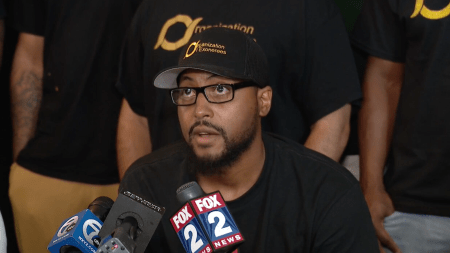
Source:Fox 2
Kenneth Nixon was only 19 when he was wrongly convicted of a murder he didn’t commit.
Now the 35-year-old Black man, who was just released in February 2021, is suing the Detroit Police Department for stealing years of his life away.
On Sept. 21, 2005, Kenneth Nixon was arrested and charged with murder for allegedly throwing a Molotov cocktail through a bedroom window of a Detroit home, which killed a 10-year-old who lived in the house.
Investigators immediately targeted Nixon for the crime, claiming he had a clear motive because his girlfriend had an alleged affair with the person who lived in the house. Four months after his arrest, Nixon was found guilty on all charges and was sentenced to life in prison without the possibility of parole.
After Kenneth Nixon’s conviction, trickling information questioning his guilt began to surface. A jailhouse informant who testified against Nixon told the Medill Justice Project that he had doubts about Nixon’s guilt.
According to Detroit Free Press, three witnesses interviewed by MJP said they saw Nixon the night of the fire and he could not have committed the crime. During the trial, prosecutors cited the gasoline on Nixon’s clothes as evidence of his guilt, but Nixon was a tow-truck driver and said he often had gasoline on his clothes. The 13-year-old star witness, Brandon Vaughn, who survived the fire was also believed to be coached, giving different accounts of the incident, including if he saw Nixon throw the Molotov cocktail.
After multiple appeals, Nixon’s case was dismissed, all charges dropped and his sentence was vacated.
“I was happy to be free for sure. I was glad we were finally able to prove my innocence,” Nixon told HuffPost. “I think overall police departments across the country could do a better job of ridding the bad actors, but they don’t.”
According to HuffPost, Kenneth Nixon’s lawsuit accuses the Detroit Police Department of bad practices, relying on “flawed investigations as well as fabricated ‘informant’ testimony” which kept him behind bars for most of his adult life.
“Overall the Detroit Police Department has a negative connotation associated with them for years,” Nixon told HuffPost. “It has been a culture for years, for decades.”
10. Tyrone Day – exonerated black man
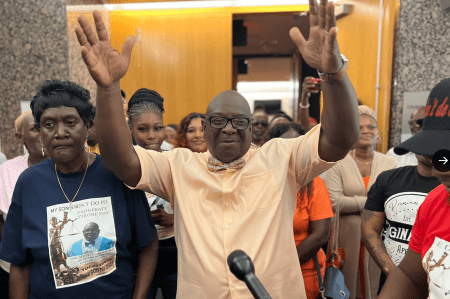
Source:Twitter
After decades in the system for a crime he didn’t commit, Tyrone Day is finally a free man.
Day, who is one of the Innocence Project’s longest-standing clients, was exonerated on May 24 after a 1990 sexual assault charge was dismissed by a Dallas County District judge.
Day was only 19 years old at the time of his arrest and after accepting a plea deal he was sentenced to 40 years in prison. Although Day had pleaded guilty, he maintained his innocence and said he only accepted the plea because he thought he would be released on parole after four years.
Tyrone Day would spend the next 26 years of his life incarcerated until he was released on parole, but life was no easier. Day was forced to register as a sex offender for life.
It wasn’t until a reinvestigation into Day’s case unearthed new evidence that proved his innocence.
From Innocence Project:
In a reinvestigation by the Dallas County District Attorney’s Office Conviction Integrity Unit (CIU), DNA testing excluded Mr. Day from the scene of the reported assault and confirmed the identity of two alternate suspects. The CIU’s investigation also revealed that the woman who reported the sexual assault hadn’t actually seen Mr. Day’s face when she identified him as one of her attackers. Instead, she had identified him from a far distance based only on a hat, which she said resembled one worn by one of her assailants.
Tyrone Day spent the last 33 years of his life fighting for his freedom and says now he is focused on family.
“I want to thank the Dallas County Conviction Integrity Unit for bringing this to a conclusion. It has been a long, hard journey for my family and me, but I never lost faith that my innocence would be proven,” said Tyrone Day. “Today, I am focused on my family and my passion for sustainable farming. I was born and raised in South Dallas, and the opportunity to bring fresh produce here, where it’s scarce, and train the next generation of farmers is so meaningful to me.”
11. David Wright
After serving 28 years in prison for a crime he did not commit, David Wright will finally be able to see his family again.
The Cook County State’s Attorney’s Office dropped all charges against Wright, who had claimed he was framed by Chicago police for double murder.
The now 46-year-old Black man was accused of killing two men in the Englewood neighborhood when he was 17 years old. He was arrested after the case had gone cold for months.
“It feels good, but at the same time it’s questionable,” Wright told ABC 7. “For the last 30 years… It’s on two family’s minds that I did something that I didn’t. So how do you change that now? You’re not going to change the bell that you rung.”
According to David B. Owens, Wright’s attorney, officers involved in Wright’s arrest allegedly coerced him into a confession.
“As a 17-year-old kid, bring him to the police station and interrogate him for 14.5-14 hours,” he said “At the end of the day, he signed a confession, we are done. And then he is criminally prosecuted and had a mandatory life sentence as a juvenile.”
Wright will now pursue a certification of innocence, which can both remove the conviction from your record and indicate that you should have never had a record in the first place.
The 1994 double murder of 16-year-old Tyronne Rocket and 26-year-old Robert Smith will now go back to being an unsolved cold case.
Sabrina Morgan, the sister of Robert Smith, told ABC she still wants answers about her brother’s death.
“If it wasn’t him, then who was it?” said Morgan. “You’ve taken two people off this earth who were loved and now we don’t have an answer.
12. Sidney Holmes
And after spending more than 34 years of a 400-year prison sentence for participating in an armed robbery he never actually was involved with, Sidney Holmes on Monday joined the growing club of Black convicts being exonerated and freed from prison.
The Innocence Project of Florida, which works to exonerate people who were wrongly convicted, released a statement attributed to Holmes after he was freed.
“I never lost hope and always knew this day would come,” Holmes, 57, said. “I cannot wait to hug my mother in the free world for the first time in over 34 years.”
Nearly three years ago, Holmes told the Innocence Project of Florida he hadn’t committed the crime for which he’d been convicted.
From the Innocence Project of Florida:
Mr. Holmes was convicted and sentenced to 400 years in prison for the 1988 armed robbery of two patrons at a Broward County gas station. Mr. Holmes became a suspect through a strange set of circumstances. One of the victims described the perpetrator’s vehicle as a Brown Oldsmobile Cutlass with a tan top and a hole in the trunk. The victim’s brother, who heard this description, believed that he was robbed earlier in the day by the same perpetrators driving the same vehicle. Then, weeks later, the victim’s brother saw a brown Cutlass while driving and provided the license plate number to authorities. This vehicle was registered to Mr. Holmes. Although Mr. Holmes’ vehicle had key differences from the perpetrator’s vehicle and he had a solid alibi–multiple family members who spent the entire day with him at a Father’s Day celebration, he still became the suspect due to this citizen investigation. Mr. Holmes was identified by one of the victims in a second photo lineup despite not being identified in an initial photo lineup that also contained his photo. There was no physical or scientific evidence, nor any corroborating witnesses, linking Mr. Holmes to the crime.
13. Ralph Blaine Smith
After spending 21 years behind bars for a crime he didn’t commit, Ralph Blaine Smith in February 2023 was released from prison after an Ohio Prosecutor declined to pursue a new trial and instead chose to drop all charges.
The state of Ohio will also now have to pay Smith, 49, $1.3 million for being wrongly imprisoned for two decades. According to the Columbus Dispatch, the Ohio Controlling Board approved the release of the settlement payment earlier this month.
In 2000, Ralph Blaine Smith was accused of armed robbery in Lancaster. During his trial, Prosecutors alleged that Smith and another Black man broke into a home occupied by two adults and their children. According to the homeowners, Smith and the other alleged intruder ordered them to open a basement safe. Prosecutors claimed the men stole rare comic books, jewelry, and about $10,000 in cash.
Smith was linked to the crime after being identified by the man and woman from a series of photos. It’s worth noting that there was no other evidence linking him to the crime. He was eventually convicted of aggravated burglary, aggravated robbery, and kidnapping along with a firearm specification. Smith was then sentenced to 67 years in prison.
He would spend the next 20 years fighting for his freedom. In 2020, he hired defense attorney Joseph Landusky and the two filed a motion for a new trial.
14. Lamar Johnson
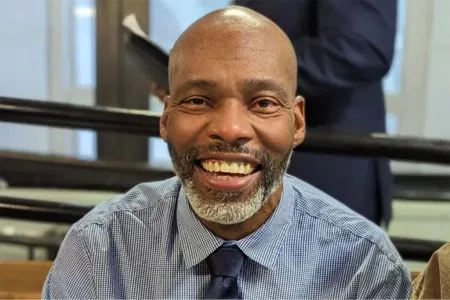
Source:Midwest Innocence Project/GoFundMe
Lamar Johnson’s life sentence was overturned and a Missouri judge determined he was wrongfully convicted for a murder he never committed, the Associated Press reported.
“This is unbelievable,” Johnson, 50, told reporters as he walked out of St. Louis Circuit Court.
Johnson was in prison for nearly 28 years.
In his ruling, Circuit Court Judge David Mason said there was “reliable evidence of actual innocence — evidence so reliable that it actually passes the standard of clear and convincing.”
From the Associated Press:
The Republican-led state attorney general’s office fought to keep Johnson locked up. A spokeswoman for the office, Madeline Sieren, said in an email that the office will take no further action in the case. She again defended the office’s push to keep Johnson behind bars.
“As he stated when he was sworn in, Attorney General (Andrew) Bailey is committed to enforcing the laws as written,” Sieren wrote. “Our office defended the rule of law and worked to uphold the original verdict that a jury of Johnson’s peers deemed to be appropriate based on the facts presented at trial.”
A GoFundMe was created for Johnson because his release from prison did not include any monetary restitution for his wrongful conviction. As of Thursday morning, more than $126,000 had been raised.
15. Raymond Flanks
On Nov. 17. 2022, Raymond Flanks had his life sentence vacated after 40 years for a murder he did not commit.
The 59-year-old Black man was released because evidence that might have cleared him years ago was withheld from his attorneys. The Orleans Parish District Attorney’s Office agreed and a state judge approved the motion to make Flanks officially a free man.
In 1983, Flanks was arrested for the murder of Martin Carnesi. According to reports, on December 17, 1983, a Black man tried to rob Carnesi and his wife. During the robbery, the man shot and killed Carnesi then pointed the gun at his wife and demanded her purse. Faye Carnesi then ran away to get help. When she gave police her statement, she described the killer as a Black man in his late 20s with a thin mustache and a “little white blotch on his cheek.”
On Dec. 23, 1983, Flanks was arrested for armed robbery at a supermarket. He was only 20 years old, he was not clean-shaven, did not have a thin mustache, and didn’t have a white blotch on his cheek. Although Flanks did not fit the description of the man who killed Carnesi, he was ultimately arrested and tried for murder in August 1984. After a long-fought trial, Flanks was convicted in 1985.
Since then he has tried to have his conviction overturned on multiple occasions, but to no avail. In 2021, the Innocence Project New Orleans began investigating his case. During their investigation, they uncovered unknown grand jury evidence as well as other discrepancies that raised doubts about the evidence used to convict Flanks.
“Even though it was delayed justice, it was justice,” Raymond Flanks told reporters after he exited the courthouse. “Time and truth prevailed in this matter.”
Now that he is a free man, he is giving all thanks to the Innocence Project New Orleans for helping him become a free man again.
“Effortless nights and waking up early in the mornings to investigate and to go get records, retrieve records that the jury has never seen or the victims family never seen,” said Flanks. “Their efforts, this is why I’m able to be free today. I can look up in the sky and see the birds flying in a different way now.”
16. Maurice Hastings
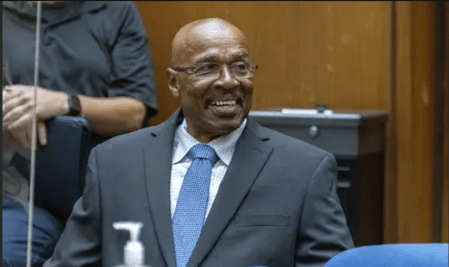
Source:iOne Digital
On October 20, 2022, Maurice Hastings had his life sentence vacated after 38 years in prison for murder and two attempted murders in 1983.
The 69-year-old Black man was released after DNA evidence that was left untested for years pointed to a different person.
Hastings consistently proclaimed innocence over years.
According to CBS News, in 2000 Hastings attempted to get the DNA tested, but was denied by the DA’s office. In 2021 he submitted a claim of innocence to the District Attorney’s Conviction Integrity Unit, which found that the DNA was not his.
In October the DNA profile was put into a state database and hit a match with a person who was convicted of armed kidnapping and was serving prison time for a different kidnapping and rape case.
“I prayed for many years that this day would come,” Hastings said during a press conference. “I am not pointing fingers; I am not standing up here a bitter man, but I just want to enjoy my life now while I have it.”
In 1983 Hastings was charged with sexually assaulting and killing Roberta Wydermyer. According to authorities, Wydermyer was killed by a single gunshot to the head. Her body was found in the trunk of her car in Inglewood, California.
When Hastings was charged, the DA sought the death penalty, but the jury deadlocked. But in 1988, a second jury would sentence him to life in prison without the possibility of parole.
Police have not released the name of the person they believed murdered Roberta Wydermyer, but said they died in prison in 2020.
Maurice Hastings won’t be able to get the years he lost back, but he will get to spend the rest of his life with the folks who love him.
17. Thomas Raynard James
On April 27, 2022, Thomas Raynard James was freed after spending 32 years in a Florida prison for a crime prosecutors found he never committed. According to the State Attorney Office Justice Project (SAO Justice Project), the now 55-year-old was convicted in 1991 for the first-degree murder of Francis McKinnon.
According to CNN, he was sentenced to life in prison with a 25-year minimum and was also sentenced for armed robbery, aggravated assault with a firearm, as well as armed burglary of an occupied dwelling with a firearm.
During his 32-year prison stint, James filed more than 10 post-conviction appeals, but each was denied.
In June 2021, James’ case was reviewed by the SAO Justice Project. They examined DNA, firearms, crime scene evidence, interviews of witnesses, and over 20,000 pages of records. They found there was no ‘physical evidence’ that tied him or anyone to the crime.
The SAO Justice Project also revealed an eyewitness had believed she made a mistake in identifying James in the crime.
Now that James is a free man, he plans to find a job and enjoy his family.
“This has been a long time coming,” he said in an interview with CNN. “Now, let me go enjoy life.”
18. Vincent Simmons, wrongly convicted of attempted aggravated rape
Imagine spending 45 years behind bars for a crime you say you didn’t commit. This was a reality for Vincent Simmons, who was set free on Feb 15., after he was granted a new trial, then his charges were dismissed. In 1977, Simmons was convicted of attempted aggravated rape of 14-year-old twin sisters. His case was awarded a new trial after Lousiana Judge William Bennett believed new evidence that had come to light should be presented in court.
With the consent of the victims, District Attorney Charlie Riddle dismissed the charges against Simmons, though he made it clear his decision wasn’t a declaration of innocence, instead a way to keep the women from going through another trial.
But Simmons’ lawyer Justin Bonus expressed a different sentiment. “What I think people really need to think about is it could be you,” he said in an interview with KALB. “You could be framed and in 60 days thrown in prison for 100 years. That is shocking.”
19. Devonia Inman, wrongly convicted for murder and robbery
Devonia Inman, an innocent man who was wrongly convicted for murder and robbery, walked out of prison a free man on Dec. 20, 2021, after 23 years of incarceration. Inman was serving time in Augusta State Medical Prison in Georgia.
The Georgia Innocence Project championed Inman and his case and announced that all charges against him had been dropped. According to the Georgia Innocence Project:
“In a 2001 death penalty trial, Devonia was convicted of the September 1998 armed robbery and murder of a Taco Bell manager in Adel, Georgia. There was no physical evidence linking Devonia to the crime and he had an alibi. After trial, three of the four key witnesses against Devonia said they lied on the witness stand because they had been pressured and coerced by the police. The fourth witness – a newspaper delivery person – was paid $5,000 for purported eyewitness testimony that was directly contracted by another newspaper delivery person who was with her at the time.”
20. Kevin Strickland, exonerated after wrongful conviction for murder
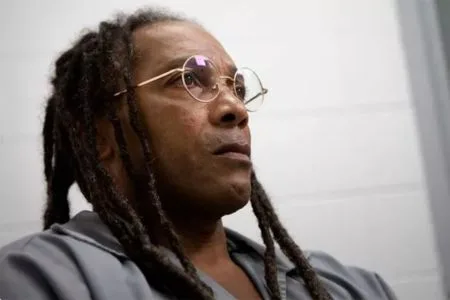
Source:GoFundMe/Tricia Rojo Bushnell
On. Nov. 23, 2021, Kevin Strickland was finally be set free from prison after serving 43 years behind bars. He gained his freedom because a Missouri prosecutor filed a motion after a new law was passed allowing local prosecutors to ask judges to free incarcerated people they believed were innocent.
A judge ruled that the conviction could not stand because the confidence in the prior determination was undermined. Experts say Strickland’s case is the longest wrongful conviction in Missouri history, and one of the longest in the country. Strickland was 18 when he was arrested in connection with a triple murder.
No physical evidence ever connected Strickland with the case. The only eyewitness previously recanted her statement before her death in 2015.
USA Today reported that he learned of the decision while watching television and the announcement scrolled across the screen.
21. Muhammad A. Aziz and Khalil Islam
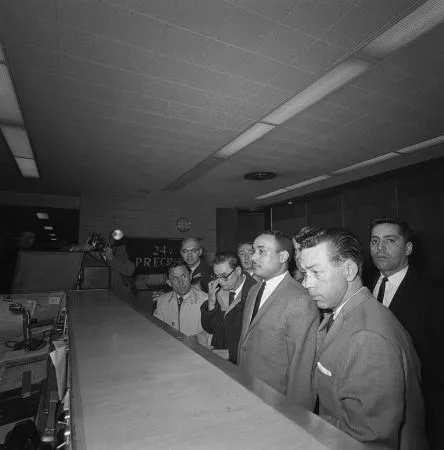
Source:Getty
Muhammad A. Aziz and Khalil Islam, formerly known as Norman 3X Butler and Thomas 15X Johnson, respectively, are expected to be cleared for the 1965 murder following a nearly two-year investigation by the Manhattan District Attorney’s Office, according to a report from the New York Times, which broke the news on Wednesday.
The move to exonerate the two men came months after new evidence in Malcolm X’s assassination that implicated both the FBI and the NYPD.
Malcolm X’s daughters held a press conference back in February to release a deathbed confession letter from Ray Wood, who worked as an undercover police officer at the time of the assassination on Feb. 21, 1965. Wood admitted in the letter to abetting the FBI and NYPD in assassinating Malcolm X. The letter was written in January of 2011.
Woods’ allegations echo theories raised in the 2020 Netflix documentary, “Who Killed Malcolm X?” which prompted the Manhattan District Attorney’s Office to review the case with the possibility to reopen it if leads proved sufficient.
The docu-series followed Abdur-Rahman Muhammad, an activist and self-trained investigator who dedicated his life work to solving the civil rights icon’s murder. In the documentary, Muhammad interviews several important figures involved in the investigation, explores different conspiracy theories including possible federal and state law enforcement involvement. Muhammad also attempts to explore an accusation that Malcolm X’s alleged killer was a Newark community leader who worshipped at a local Mosque.
The Manhattan District Attorney’s Office did not say who was actually responsible for Malcolm X’s assassination, for which three men were jailed. Talmadge Hayer – later known as Mujahid Abdul Halim – admitted he took part in the murder, while Aziz and Islam maintained their innocence. Aziz was released on parole in 1985; Islam was released in 1987 but died in 2009; Halim was released in 2010.
The DA’s investigation uncovered evidence that “prosecutors and two of the nation’s premier law enforcement agencies — the Federal Bureau of Investigation and the New York Police Department — had withheld key evidence that, had it been turned over, would likely have led to the men’s acquittal,” the Times reported.
22. Juwan Deering
A judge in September 2021 dismissed murder charges against Juwan Deering, who had served 15 years for the arson deaths of five children in a Detroit suburb.
Deering, who is now 50 years old, told the Associated Press that he was thrilled at the judge’s ruling while briefly addressing his nearly two decades behind bars for a crime he never committed.
“It’s been a hard uphill battle. … The sun couldn’t shine on not a brighter day,” Deering said Thursday after the judge’s ruling. “This is the brightest for me.”
In a familiar theme with so many exonerations, members of law enforcement stepped forward to say that there was insufficient evidence to charge Deering for the 2000 fire.
Deering had been serving a life sentence for the deaths in a fire that police said was set as “revenge for drug debts,” the AP reported earlier this year. However, there were no eyewitnesses.
Oakland County prosecutor Karen McDonald suggested that the fire in Royal Oak Township was not arson after all.
A Michigan law could mean that Deering will be paid $50,000 for each of the 15 years he spent in prison, amounting to more than $700,000 if there is proof that he was wrongly convicted.
Deering’s exoneration, like many others, also needed a bit of good fortune.
That happened when McDonald, a former judge, voluntarily revisited the case following her election last year.
“Fairness and transparency are paramount,” McDonald said at the time. “We must always do the right thing, even if it exposes our own office, even when it’s not easy.”
McDonald added: “As prosecutors, we have an ethical duty to disclose information that bears on the guilt or innocence of the accused. We also have a duty to disclose to juries what, if anything, an informant was given in consideration for their testimony. Based on the evidence I reviewed, I am gravely concerned that this was not done in the case against Juwan Deering.”
24. Walter Forbes
Walter Forbes, 63, was released from prison on Nov. 20, 2021, after a key witness in his case admitted they lied. Forbes was falsely convicted of arson and murder and spent 37 years, almost four decades, behind bars.
25. Termaine Joseph Hicks
Termaine Joseph Hicks was accused of raping a woman who he says was attacked before he heard her cries for help and went to assist her in 2001. That’s when police arrived on the scene and promptly shot Hicks in the back, claiming he had a gun. The jury that convicted Hicks never saw evidence that would have presented reasonable doubt he committed the crime. Namely, video surveillance that contradicted police accounts, including cops’ assertion they shot Hicks in the abdomen, was never presented during the trial.
“False testimony was used,” Patricia Cummings, chief of the Conviction Integrity Unit, told the Philadelphia Inquirer. “And I believe it’s impossible to say that did not contribute to the conviction.”
26. Clifford Williams, Nathan Myers
Clifford Williams and his nephew Nathan Myers spent 43 years in prison for a murder that they did not commit. According to the Florida Phoenix, the uncle and nephew were convicted of fatally shooting a woman named Janette Williams, who was not related to either of the men, in her bedroom in 1976. Williams and Myers’ convictions were found to be based on one witness’ account: the victim’s partner. There was also no forensic evidence to corroborate the witness’ testimony. A man named Nathaniel Lawson later confessed to killing Williams in a drug dispute. It was later discovered that the bullets that killed Williams came from outside of her window, not inside of her home, according to the report.
Williams was 33 and Myers was 18 when they were convicted.
27. Calvin Bright
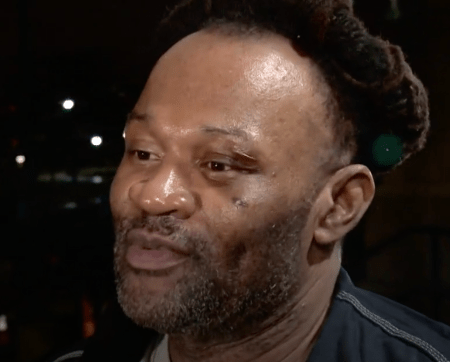
Source:WUSA9
Calvin Bright walked free after serving 25 years in a Washington, D.C., prison for a double murder that he did not commit. According to a report from the Associated Press, Bright was convicted of first-degree murder in 1994 for the shooting deaths of Tammy Peay and William Ramsey. However, Bright’s lawyers had no knowledge of a letter from DC police, which named another man as a suspect in the murders, and according to his legal counsel could have changed the entire trajectory of his case. The report says Bright maintained his innocence and recently passed a polygraph test, which questioned if he committed the murders.
Bright was originally sentenced to 65 years to life but reached a settlement with the U.S. State’s Attorney’s Office and his sentence is now “time served,” according to WUSA9. Per the agreement, he also cannot sue for his wrongful conviction.
28. Kevin Baker, Sean Washington
Kevin Baker and Sean Washington spent 25 years in prison for a 1995 double murder at a housing complex in Camden, New Jersey, for which they had both maintained their innocence. Baker and Washington were convicted after being on trial for only two days. A woman named Denise Rand, who testified in the case, told jurors that she was high on crack cocaine when she witnessed Baker and Washington approach Rodney Turner and Margaret Wilson, shooting them both in the head.
A three-judge appellate dropped the case because the witness “vacillated on many aspects of her narrative.”
Baker said he was not near the scene when the incident took place. Washington said he discovered the bodies and called 911. The 911 call surfaced years later.
The evidence also proved the men’s innocence as “ballistics and forensics testing that showed the victims were killed by a single shooter while lying in the courtyard — not by two shooters while standing upright, as Rand had testified,” according to NJ.com.
The appeals court also determined that the evidence, in addition to Washington’s 911 call, would result in a different verdict from the jury.
Camden County Prosecutor’s Office said neither Baker nor Washington will be retried for the crime. The office additionally said that the notice of reinstating their convictions will be retracted.
29. Theophalis Wilson
Theophalis Wilson was freed from prison after serving 28 years for a triple murder that he did not commit. The Philadelphia Court of Common Pleas exonerated the 48-year-old and ordered his immediate release following a judge tossing his conviction due to “serious misconduct by the prosecution, an ineffective defense and a witness who supplied false testimony,” according to a Philadelphia ABC affiliate.
30. Alfred Chestnut, Ransom Watkins, and Andrew Stewart
In November 2019, Alfred Chestnut, Ransom Watkins, and Andrew Stewart from Baltimore were freed from prison after 36 years for a wrongful murder conviction. They were accused of shooting and killing 14-year-old DeWitt Duckett after allegedly trying to rob him of his Georgetown University Starter jacket in 1983. Police arrested the three teens on Thanksgiving Day that year. They were ultimately convicted of murder and sentenced to life in prison. Prosecutors later admitted that the case “encouraged false witness testimony and ignored evidence of another assailant.”
31. Deandre Charles
Deandre Charles, who was 15 years old at the time, was accused of gunning down Rabbi Joseph Raksin in August 2014. Evidence in the case used by prosecutors included a faulty suspect sketch, which looked like it could have been the work of a middle schooler. The police claimed that Charles’ DNA was on the murder weapon and the getaway vehicle. Investigators also said cellphone records indicated that the teenager was near the crime scene. However, the circuit judge presiding over the case criticized the prosecutor for its circumstantial evidence that fell apart. He ordered the prosecutor to release Charles on bail in March 2016. The district attorney dropped the charges in January 2017.
32. Exonerated Five – Raymond Santana, Kevin Richardson, Antron McCray, Yusef Salaam and Korey Wise
In 2002, the now-Exonerated Five — Raymond Santana, Kevin Richardson, Antron McCray, Yusef Salaam and Korey Wise — were released from prison after being wrongfully convicted of crimes related to the rape of a white woman, Trisha Meili, in Central Park in 1989. The men, who were teens between the ages of 14 and 16 at the time, became labeled the Central Park Five. The prosecution of the teens was based on confessions they made after being interrogated by police, with neither counsel nor parents present. Their convictions were vacated after Matias Reyes, a convicted murderer and serial rapist serving a life sentence in prison, confessed to the crime in 2001.
They were exonerated in 2002. Following their release, the five men filed a lawsuit against the City of New York for malicious prosecution, racial discrimination, and emotional distress, and received a $41 million settlement. They also sued New York State for additional damages. The lawsuit was settled in 2016 for $3.9 million.
33. Anthony Ray Hinton
Anthony Ray Hinton was wrongly convicted of two murders that took place in Jefferson County, Alabama in 1985. Despite having no witnesses and no fingerprint evidence, the State convicted him by saying the murder weapon, a gun, was at his mother’s home. He spent nearly 30 years in prison for a murder he didn’t commit. He was exonerated in 2015. The movie, ‘Just Mercy,’ is based on his life.
34. Lamar Johnson
After more than 13 years in prison, a judge tossed the wrongful conviction of Lamar Johnson after three new witnesses came forward to say he was not the gunman who killed Carlos Sawyer in 2004. While Johnson has been technically exonerated, “a battle in Missouri between his progressive prosecutor and a conservative state attorney general has left him in limbo,” PBS reported in the summer of 2021.
35. Wilbert Jones
Wilbert Jones spent 45 years in prison for a rape he did not commit. He was given a life sentence without parole after allegedly abducting a nurse outside of Baton Rouge hospital. Baton Rouge Judge Richard Anderson released Jones on a $2,000 bond, claiming that there wasn’t enough evidence to show that he committed the crime.
36. Xavier Davis

Source:Courtesy of Xavier Davis
Xavier Davis was jailed for months in 2018 for alleged sexual assault that he did not commit. Davis was cleared of wrongdoing through DNA evidence. He told NewsOne at the time, “I lost everything by going to jail. I lost my job and was homeless when I got out of jail.”
However, as of July 2021, Davis remained jailed
37. Huwe Burton
In 1991, Huwe Burton was arrested at age 16 for the killing of his mother. His confession was coerced by detectives, and after spending nearly 20 years behind bars and another 10 on parole, he was exonerated in 2019.


